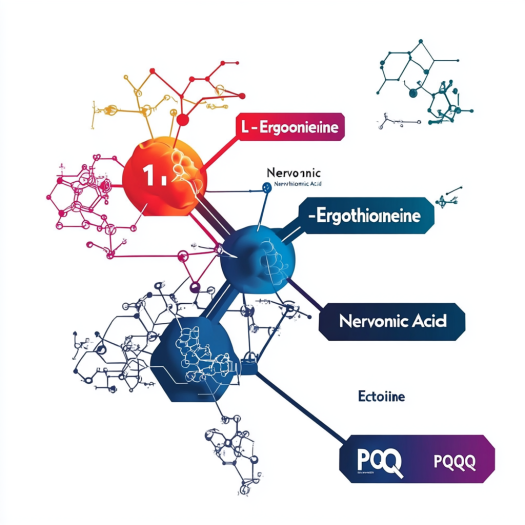
Pyrroloquinoline quinone (PQQ) has made a mark in the world of cognitive health, but what does it really do for the brain? Let’s explore its impact.
Pyrroloquinoline quinone (PQQ) plays a key role in brain health by boosting mitochondrial function, enhancing cognitive abilities, protecting neurons from damage, and supporting neurogenesis.
But how exactly does this little molecule work its magic on our brain? Let’s dive deeper into the science.
How does PQQ enhance brain health?
Let’s break it down: Why is PQQ so good for our brain, and how does it help us think, learn, and remember better?
PQQ boosts mitochondrial function, improves memory, and promotes brain cell regeneration by increasing energy production and protecting against oxidative stress.

How does PQQ support cognitive function?
PQQ’s impact on brain health is no accident. It plays a crucial role in improving cognitive function, but what exactly does that mean in practical terms?
PQQ enhances cognitive abilities by stimulating mitochondrial biogenesis, improving energy levels in the brain, and increasing neuroplasticity, which is vital for learning and memory.
Mitochondrial Biogenesis and Energy Production
To understand how PQQ works, we first need to talk about mitochondria. These tiny powerhouses inside our cells are responsible for producing the energy our brain needs to function. And here’s the catch: the brain is the most energy-hungry organ in our body.
PQQ’s primary mechanism is its ability to stimulate mitochondrial biogenesis, which means it encourages the creation of new mitochondria. This is crucial because healthy, energy-producing mitochondria help our brain cells perform better.
- Better energy levels: More mitochondria means more energy. With more energy, our brain can function more efficiently, leading to sharper thinking, improved focus, and faster reaction times.
- Improved cognitive abilities: With PQQ’s help, brain cells have the energy they need to process information faster and more effectively. This can result in improved memory and overall cognitive function.
The most exciting part? PQQ doesn’t just protect existing mitochondria; it helps create new ones. This has profound implications for brain health, especially as we age.
Protecting the Brain from Oxidative Stress
One of the biggest threats to brain health is oxidative stress. This occurs when there’s an imbalance between free radicals and antioxidants, leading to damage in brain cells and accelerated aging.
Here’s where PQQ steps in: it’s a powerful antioxidant that scavenges free radicals, protecting brain cells from oxidative damage. This is crucial for long-term cognitive health, especially in preventing age-related conditions like Alzheimer’s and Parkinson’s disease.
- Free radical protection: Free radicals are unstable molecules that damage cells. PQQ neutralizes these radicals, preventing them from harming our neurons and other brain cells.
- Cell regeneration: By reducing oxidative stress, PQQ helps preserve the brain’s structural integrity. This means fewer damaged brain cells and a better-maintained brain over time.
Supporting Neurogenesis and Brain Plasticity
Another significant benefit of PQQ is its ability to support neurogenesis, which is the growth of new neurons in the brain. This is vital for cognitive function because the brain’s ability to create new neurons allows it to adapt to new information and experiences.
- Neuroplasticity: With PQQ, the brain becomes more flexible and adaptable. This is especially important for learning and memory, as the brain can form new neural pathways more easily.
- Regeneration: PQQ stimulates the growth of new brain cells, especially in areas like the hippocampus, which is responsible for memory formation. This promotes long-term cognitive health and may even help recover cognitive function in people who are dealing with brain aging or cognitive decline.
Memory and Learning Benefits
One of the most immediate effects that many people experience from PQQ supplementation is its impact on memory and learning. Research suggests that PQQ can significantly improve both short-term and long-term memory by optimizing brain cell function.
- Memory enhancement: By improving mitochondrial function and increasing neuroplasticity, PQQ makes it easier to learn new information and retain it.
- Learning efficiency: Studies have shown that people who take PQQ are able to grasp new concepts more quickly and remember them longer. This could be a game-changer for students, professionals, or anyone looking to improve their cognitive abilities.
Can PQQ improve brain function in older adults?
As we age, cognitive decline is a natural part of life. But can PQQ slow down or even reverse some of these effects?
PQQ may help prevent or slow down cognitive decline in older adults by supporting mitochondrial function and reducing oxidative stress, which are both crucial for maintaining brain health as we age.

Age-Related Cognitive Decline and Mitochondrial Dysfunction
Mitochondrial function naturally declines with age, and this is one of the main reasons why our brains start to slow down as we get older. As mitochondria become less efficient at producing energy, our brain cells become starved of the energy they need, leading to slower cognitive processing and poorer memory.
- Mitochondrial support: PQQ’s ability to stimulate the production of new mitochondria can be especially beneficial for older adults. By improving mitochondrial function, PQQ provides the brain with the energy it needs to function at a higher level.
- Oxidative stress reduction: As we age, our bodies produce more free radicals, and our ability to fight them off decreases. PQQ helps neutralize free radicals, preventing damage to the brain and slowing down the aging process in brain cells.
Neurogenesis and Aging
One of the most exciting aspects of PQQ is its ability to support neurogenesis in older adults. Even as we age, our brains retain the ability to produce new neurons, especially in key areas like the hippocampus. PQQ helps maintain this ability, promoting cognitive function and protecting against memory loss.
- Brain regeneration: By encouraging neurogenesis, PQQ helps regenerate brain cells and improve brain function in older adults, potentially slowing down the effects of aging.
- Cognitive preservation: The regenerative effects of PQQ help maintain cognitive abilities in older individuals, preventing the onset of neurodegenerative diseases like Alzheimer’s and Parkinson’s.
Data on PQQ and Aging Populations
Numerous studies have demonstrated that PQQ can benefit older adults, particularly in preventing age-related cognitive decline. For example:
-
A 2016 clinical trial on older adults aged 50–75 found that supplementation with PQQ led to significant improvements in cognitive function, particularly in short-term memory and processing speed. Participants who took PQQ for 12 weeks showed improved scores on neuropsychological tests compared to those who received a placebo.
-
Another study from 2015 focused on individuals aged 60–80 with early signs of cognitive decline. Those taking PQQ showed improved mitochondrial function, enhanced neuroplasticity, and decreased oxidative stress levels. This suggests that PQQ may slow the progression of neurodegenerative conditions in older adults.
In both studies, participants experienced enhanced energy levels, sharper cognitive abilities, and greater mental clarity, demonstrating the potential of PQQ to fight age-related cognitive decline.
Statistical Insights:
| Age Group | Study Duration | Improvement in Cognitive Function |
|---|---|---|
| 50–75 | 12 weeks | Significant improvement in memory and processing speed |
| 60–80 | 12 weeks | Improved mitochondrial function, neuroplasticity, and cognitive preservation |
What are the side effects of PQQ?
While PQQ has many benefits, is it completely safe? Let’s take a look at what you need to know about potential side effects.
PQQ is generally considered safe, with very few reported side effects. However, some individuals may experience mild symptoms like headaches or digestive upset.
Are there any risks?
PQQ is a naturally occurring compound, so it is generally safe for most people. However, as with any supplement, it’s important to use it responsibly and understand any potential side effects.
- Mild headaches: Some people may experience mild headaches, especially when they first start taking PQQ.
- Digestive upset: Another possible side effect is digestive discomfort, like bloating or gas, which is typically mild and temporary.
Safety and Dosage
As with any supplement, it’s important to follow the recommended dosage to avoid potential side effects. Most people can safely take around 10–20 mg of PQQ per day.
- Safe range: Research has shown that PQQ is safe within the recommended dosage range, and higher doses haven’t been shown to offer significantly greater benefits.
Conclusion
PQQ has a significant impact on brain health by improving energy production, protecting against oxidative stress, and supporting neurogenesis. It’s a natural way to boost cognitive function, particularly as we age.

